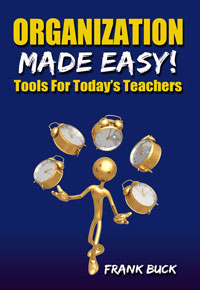Good but Incomplete Advice
Organization Made Easy! / Tools for Today’s Teachers
by Frank Buck
(Eye on Education/Routledge, 2010 – Learn more)
There is a lot to like in Organization Made Easy! Many well-described concrete recommendations will help teachers handle paperwork effectively (though not student work – more on this later).
Many practical ideas will help teachers stay personally organized, using either paper resources like a calendar/daytimer or a smartphone/PDA. The author also provides useful ideas about managing email effectively (for example: drag the email into your Outlook calendar if a meeting is needed). He even provides specific tips for using Outlook for email, calendar, and task-list. I suspect one could adapt many of these ideas for Google tools.
 Buck also offers good ideas about chunking your work – instead of shifting constantly from email to project to person with a question to email. I loved the section about organizing the way you keep files on your computer, which was both well-thought out and well-described. There was even a section about how to help students use their agendas/assignment books to stay organized. But key areas are absent or incomplete.
Buck also offers good ideas about chunking your work – instead of shifting constantly from email to project to person with a question to email. I loved the section about organizing the way you keep files on your computer, which was both well-thought out and well-described. There was even a section about how to help students use their agendas/assignment books to stay organized. But key areas are absent or incomplete.
What’s missing in this book
The differences between elementary and secondary classrooms are not always recognized here, and the classroom examples are all elementary. For example, the suggested way to avoid wasting time passing out graded papers – a pigeon-hole for each student – is workable only when you have 25 students. The author doesn’t suggest anything for secondary teachers with larger class sizes.
I had hoped for lots of good ideas for dealing with paper-grading, since as an English teacher I read several thousand writing pieces a year. Page 136 has six good ideas to reduce the need for grading. One (which I use myself and it has saved my sanity) is that you don’t have to grade everything.
But only three pages out of 160 address grading. Having expected at least a chapter, I was disappointed.
I was looking for ways to organize papers to work with an electronic grade book, but grade books are barely mentioned. I was looking for ideas for staying organized between my school computer and my home computer – a real chore for all of us – but this isn’t addressed either.
I can’t help feeling that the author is writing from the office rather than the classroom. For example, he keeps urging his readers to delegate – to adults. I kept wondering which adults he thought I could delegate to. He also spends six pages on creating a tickler file to keep track of paperwork, and another four pages on in/ pending/out boxes. These are dandy ideas, but too complex for the non-student-papers paperwork I have to deal with. If I was a principal, though, I’d want systems like these.
Much of this book is practical and helpful, for both teachers and administrators. I’m glad I read it and I still recommend it. But if you’re looking for ways to manage all those papers you have to grade, this may not be the right book for you.
Fran Lo teaches English, Social Studies, and Computer Skills to middle schoolers in Connecticut, where she enjoys blending technology into her classes. One of her other hats is technology guru for teachers and staff. Prior to teaching, she helped people cope with technology in small businesses, health care, and the financial industry.


































